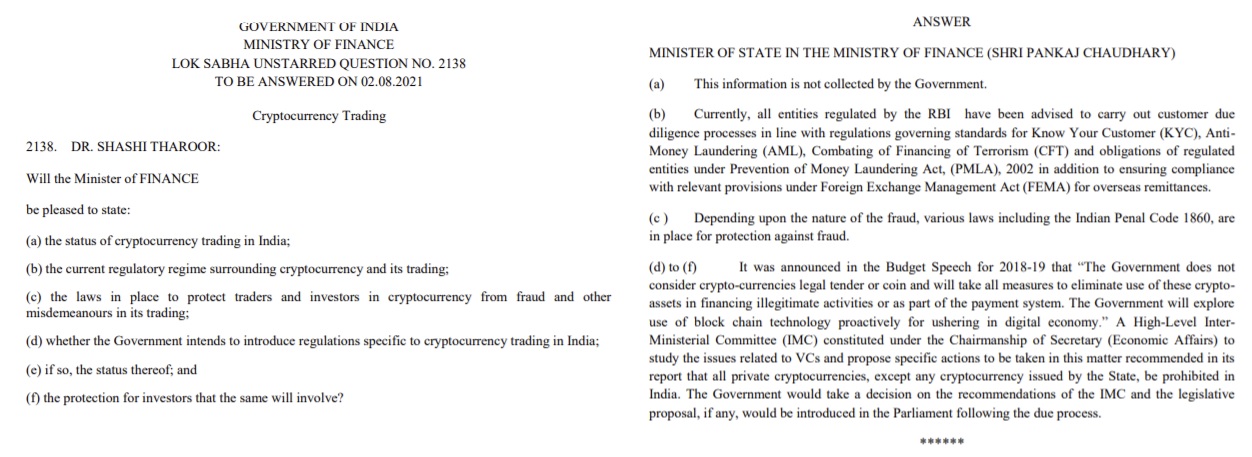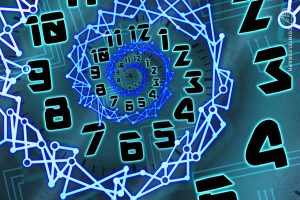Indian Government Clarifies Status of Cryptocurrency Trading, Regulation, Investor Protection – Regulation Bitcoin News

India’s Ministry of Finance has answered some questions regarding the status of cryptocurrency trading in the country as well as crypto regulation and investor protection. The minister of state for the finance ministry has indicated that the recommendations in the draft bill proposed by the interministerial committee are still being considered.
Indian Government Answers Crypto Questions
The Indian minister of finance was asked about cryptocurrency trading in Lok Sabha, the lower house of India’s parliament on Monday.
The first question concerns “the status of cryptocurrency trading in India.” Minister of State for the Ministry of Finance Shri Pankaj Chaudhary replied, “This information is not collected by the government.”
His answer reiterates what the finance minister recently said that the government does not collect information on the number of cryptocurrency exchanges or traders in India and has not been informed of any fraud conducted by any exchanges.
The second question was about “the current regulatory regime surrounding cryptocurrency and its trading.”
The minister of state explained that all entities regulated by the central bank, the Reserve Bank of India (RBI), have been advised to carry out customer due diligence processes in line with a number of regulations, including know your customer (KYC) standards, anti-money laundering (AML) law, Prevention of Money Laundering Act (PMLA), and Foreign Exchange Management Act (FEMA) for overseas remittances.

Next, the finance minister was asked about the laws in place to protect crypto traders and investors “from fraud and other misdemeanors in its trading.” The minister replied:
Depending upon the nature of the fraud, various laws including the Indian Penal Code 1860, are in place for protection against fraud.
The last three questions revolve around “whether the government intends to introduce regulations specific to cryptocurrency trading in India.”
The minister of state proceeded to provide the same answer said several time in parliament, starting with the announcement in the Budget Speech for 2018-19 that “The government does not consider cryptocurrencies legal tender or coin and will take all measures to eliminate use of these crypto-assets in financing illegitimate activities or as part of the payment system.”
The minister then mentioned the inter-ministerial committee (IMC) constituted under Former Finance Secretary Subhash Chandra Garg, who no longer holds a position in government. The minister stated that the IMC “recommended in its report that all private cryptocurrencies, except any cryptocurrency issued by the state, be prohibited in India,” adding:
The government would take a decision on the recommendations of the IMC and the legislative proposal, if any, would be introduced in the parliament following the due process.
Recently, the finance minister revealed that the crypto cabinet note is ready for consideration. However, the crypto bill is not listed on the list of items to be considered in this parliament session.
What do you think about the answers to the crypto questions provided by the minister of state for the finance ministry? Let us know in the comments section below.
Image Credits: Shutterstock, Pixabay, Wiki Commons
Disclaimer: This article is for informational purposes only. It is not a direct offer or solicitation of an offer to buy or sell, or a recommendation or endorsement of any products, services, or companies. Bitcoin.com does not provide investment, tax, legal, or accounting advice. Neither the company nor the author is responsible, directly or indirectly, for any damage or loss caused or alleged to be caused by or in connection with the use of or reliance on any content, goods or services mentioned in this article.














